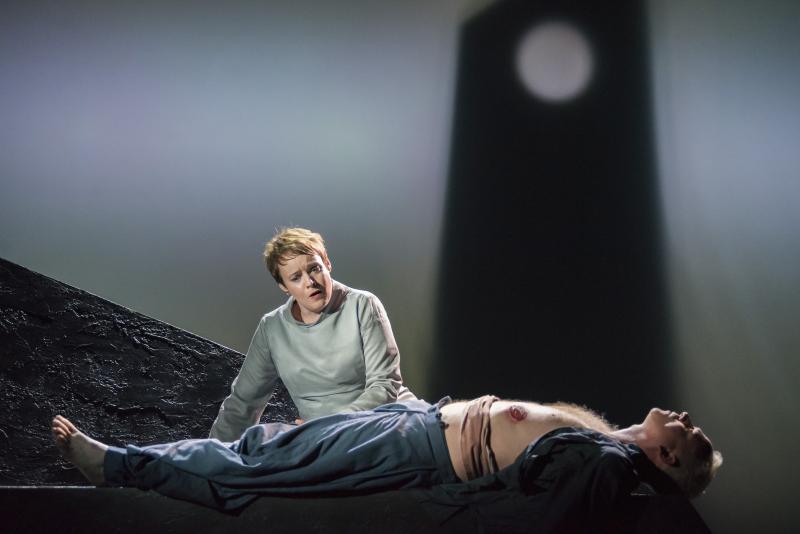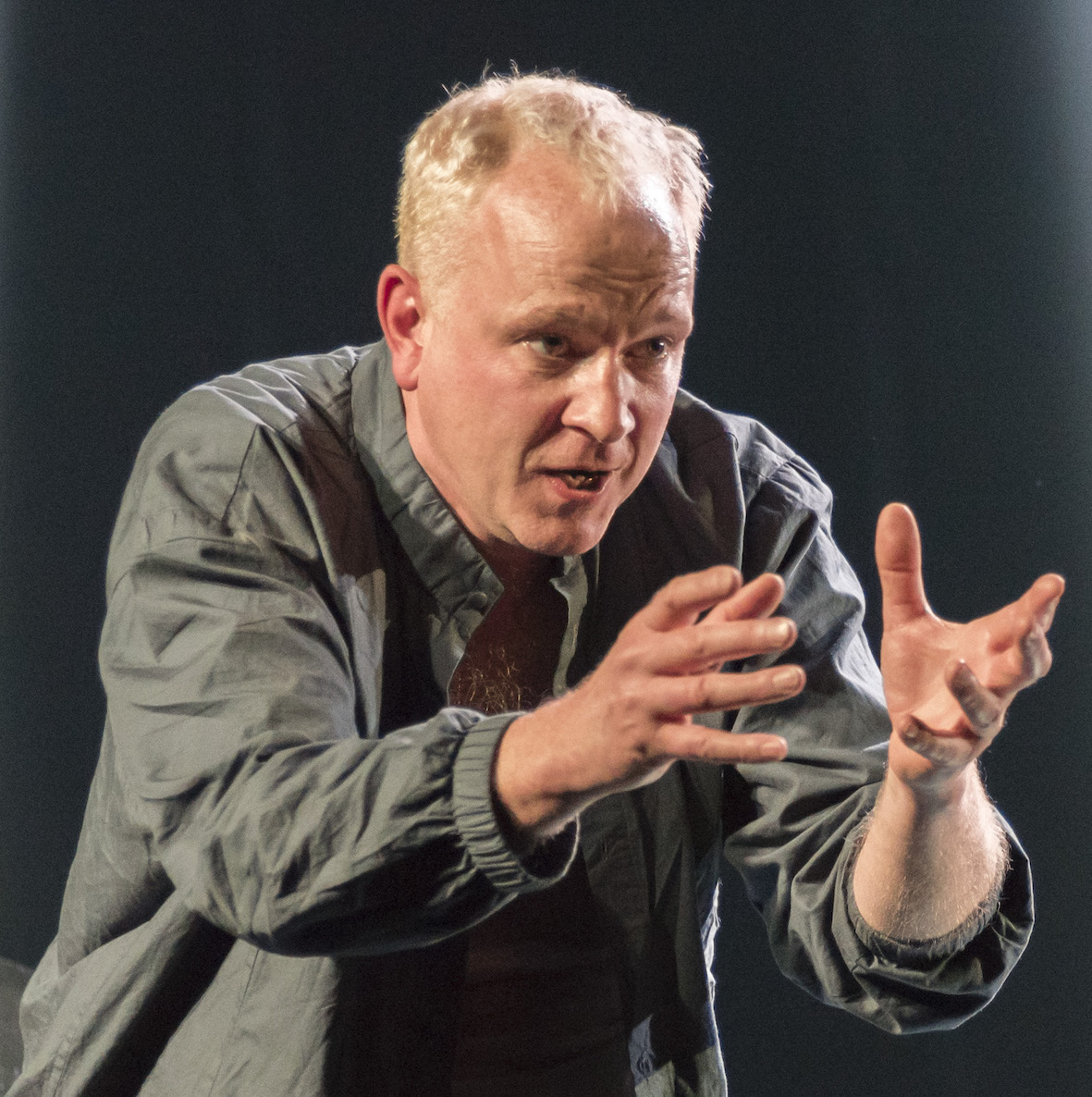Tristan und Isolde, Longborough Festival | reviews, news & interviews
Tristan und Isolde, Longborough Festival
Tristan und Isolde, Longborough Festival
Wagner still alive and well at Gloucestershire barn festival

It’s well-known that Wagner shelved The Ring two thirds of the way through in favour of Tristan with the aim of producing something that could be put on quickly in a conventional theatre. Of course, it didn’t quite work out that way. Yet Tristan, for all its technical difficulties, does lend itself to a relatively small stage. Its ensemble scenes are few and manageable, and for the rest it’s basically a conversation piece.
To get the best out of it, admittedly, one has to shut one’s eyes to one or two of Carmen Jakobi’s brighter production ideas. The rudimentary sets by Kimie Nakano, cleverly lit in chiaroscuro by Ben Ormerod, reflect well in their cool abstraction the essential stillness of the work’s exterior narrative. When left to themselves, the characters move and interact perfectly well in their standard issue Wagner tunics.
Unfortunately Jakobi imposes on them a Jungian reading that requires Tristan and Isolde’s animus and anima to be embodied in a pair of dancers who sashay on and off, waving their arms and legs and occasionally fondling their alter egos, like spoilt children home from ballet class. What this adds to our understanding of Wagner’s fairly simple yarn I’ve no idea. But it does distract horribly from the music drama, often at its profoundest moments, like the A flat Act 2 duet or the later stages of Tristan’s delirium in Act 3.
A certain hesitancy in Rachel Nicholls’s Isolde - this is no Hoffnungesque Wagner sopranoI was also baffled by the presence of the bass clarinettist onstage during King Mark’s Act 2 monologue. Another schoolkid showing off? For an instant, the king glared at her as if she were to blame for the entire mess-up; or perhaps he was merely wondering, like me, why she was there at all.
While the kids are at school, though, all is fine. The small Longborough stage encourages a degree of intimacy in the direction, which turns out to suit Wagner surprisingly well. One feels close to the characters and senses refinements in the way they’re drawn: for instance, a certain hesitancy in Rachel Nicholls’s Isolde, a lingering reproach at Tristan’s initial unresponsiveness, and a youthfulness emphasised by her rather small stature and close-cropped hair. This is no Hoffnungesque Wagner soprano. Musically, too, she profits from the smallness of the space, has no need to over-sing, so can colour her voice to the changing moods. All in all hers is a beautiful, touching performance, faltering only momentarily in the Liebestod, though whether from weariness or failing concentration I’d hesitate to say.
 Peter Wedd’s Tristan (pictured right) is in almost every way superb: statuesque and chilly in the early scenes, pulsatingly emotional to the point of disintegration thereafter, but never losing control of his fine, slightly dry tenor. I’m largely immune to the rantings of the final act (and find its music, after the prelude, not much better than expert), but was riveted by Wedd’s musical portrait of deranged passion.
Peter Wedd’s Tristan (pictured right) is in almost every way superb: statuesque and chilly in the early scenes, pulsatingly emotional to the point of disintegration thereafter, but never losing control of his fine, slightly dry tenor. I’m largely immune to the rantings of the final act (and find its music, after the prelude, not much better than expert), but was riveted by Wedd’s musical portrait of deranged passion.
The remaining cast are uniformly excellent: Frode Olsen an intense, vivid King Mark, wavering between bitter reproach and thwarted affection, Catherine Carby a strong, sisterly Brangaene, spinning a marvellous line from her watchtower, and Stuart Pendred a solid, dependable Kurwenal.
But the biggest hero of the production is Anthony Negus, who shows yet again what a genuinely great Wagnerian he is. What kind of a system is it that can have consistently bypassed a conductor of this quality? Not only does he have a complete grasp of the broad Wagner rhetoric, but he has a wonderful ear for detail, something that comes out particularly in this small house, with – I guess – fewer strings, so that the woodwind and brass speak without blasting, and the voices come across without bellowing. The sheer sound of this performance – so far as I can tell uncut – is not the least of its many pleasures.
Add comment
The future of Arts Journalism
You can stop theartsdesk.com closing!
We urgently need financing to survive. Our fundraising drive has thus far raised £49,000 but we need to reach £100,000 or we will be forced to close. Please contribute here: https://gofund.me/c3f6033d
And if you can forward this information to anyone who might assist, we’d be grateful.

Subscribe to theartsdesk.com
Thank you for continuing to read our work on theartsdesk.com. For unlimited access to every article in its entirety, including our archive of more than 15,000 pieces, we're asking for £5 per month or £40 per year. We feel it's a very good deal, and hope you do too.
To take a subscription now simply click here.
And if you're looking for that extra gift for a friend or family member, why not treat them to a theartsdesk.com gift subscription?
more Opera
 Albert Herring, English National Opera review - a great comedy with depths fully realised
Britten’s delight was never made for the Coliseum, but it works on its first outing there
Albert Herring, English National Opera review - a great comedy with depths fully realised
Britten’s delight was never made for the Coliseum, but it works on its first outing there
 Carmen, English National Opera review - not quite dangerous
Hopes for Niamh O’Sullivan only partly fulfilled, though much good singing throughout
Carmen, English National Opera review - not quite dangerous
Hopes for Niamh O’Sullivan only partly fulfilled, though much good singing throughout
 Giustino, Linbury Theatre review - a stylish account of a slight opera
Gods, mortals and monsters do battle in Handel's charming drama
Giustino, Linbury Theatre review - a stylish account of a slight opera
Gods, mortals and monsters do battle in Handel's charming drama
 Susanna, Opera North review - hybrid staging of a Handel oratorio
Dance and signing complement outstanding singing in a story of virtue rewarded
Susanna, Opera North review - hybrid staging of a Handel oratorio
Dance and signing complement outstanding singing in a story of virtue rewarded
 Ariodante, Opéra Garnier, Paris review - a blast of Baroque beauty
A near-perfect night at the opera
Ariodante, Opéra Garnier, Paris review - a blast of Baroque beauty
A near-perfect night at the opera
 Cinderella/La Cenerentola, English National Opera review - the truth behind the tinsel
Appealing performances cut through hyperactive stagecraft
Cinderella/La Cenerentola, English National Opera review - the truth behind the tinsel
Appealing performances cut through hyperactive stagecraft
 Tosca, Royal Opera review - Ailyn Pérez steps in as the most vivid of divas
Jakub Hrůša’s multicoloured Puccini last night found a soprano to match
Tosca, Royal Opera review - Ailyn Pérez steps in as the most vivid of divas
Jakub Hrůša’s multicoloured Puccini last night found a soprano to match
 Tosca, Welsh National Opera review - a great company reduced to brilliance
The old warhorse made special by the basics
Tosca, Welsh National Opera review - a great company reduced to brilliance
The old warhorse made special by the basics
 BBC Proms: The Marriage of Figaro, Glyndebourne Festival review - merriment and menace
Strong Proms transfer for a robust and affecting show
BBC Proms: The Marriage of Figaro, Glyndebourne Festival review - merriment and menace
Strong Proms transfer for a robust and affecting show
 BBC Proms: Suor Angelica, LSO, Pappano review - earthly passion, heavenly grief
A Sister to remember blesses Puccini's convent tragedy
BBC Proms: Suor Angelica, LSO, Pappano review - earthly passion, heavenly grief
A Sister to remember blesses Puccini's convent tragedy
 Orpheus and Eurydice, Opera Queensland/SCO, Edinburgh International Festival 2025 review - dazzling, but distracting
Eye-popping acrobatics don’t always assist in Gluck’s quest for operatic truth
Orpheus and Eurydice, Opera Queensland/SCO, Edinburgh International Festival 2025 review - dazzling, but distracting
Eye-popping acrobatics don’t always assist in Gluck’s quest for operatic truth
 MARS, Irish National Opera review - silly space oddity with fun stretches
Cast, orchestra and production give Jennifer Walshe’s bold collage their all
MARS, Irish National Opera review - silly space oddity with fun stretches
Cast, orchestra and production give Jennifer Walshe’s bold collage their all

Comments
I agree - but the night I saw
I agree with bot the comments